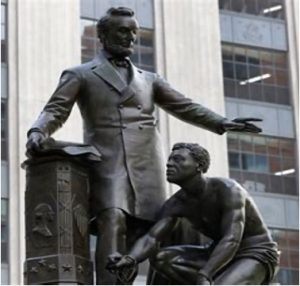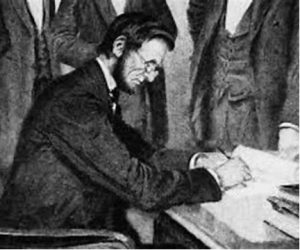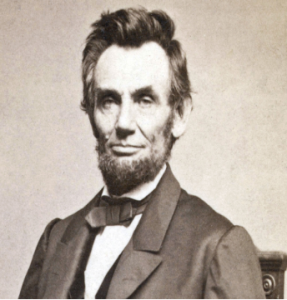- Home
- Academics
- First-Year Writing
- Phoenix Rhetorix
- 2022-23 Journal
- Reinterpreting Lincoln
Reinterpreting Lincoln
Reinterpreting Lincoln
A Beginner’s Guide by Maleah Proctor (she/her)
We’ve all sat through an American History class and listened to relatively similar lectures about the Constitution and the Founding Fathers. The stories often tie up nicely with happy endings and moral virtues in a version of our history that seems like Walt Disney himself could have directed it. But like most things in life, if it seems too good to be true, it is. Our history is no exception. There is a trend in our K-12 education system of leaving out the controversial and serving our youth a more palatable or watered-down version of American history. An example of this pattern is the controversy surrounding Florida’s curriculum and its approach to teaching African-American history. Florida’s “Stop Woke Act” places stipulations on how certain materials can be taught in schools, some of which seek to sanitize and dilute slavery’s messy history in the United States (Burga 2023). Critics of Florida’s curriculum stipulations argue that watering down American history will give rise to an uninformed youth. This essay seeks to examine the phenomenon of surface-level history education through the lens of Abraham Lincoln. We will discuss what is commonly known about Lincoln versus the reality of his polarizing legacy.
Lincoln Was Not For Equality
 Monument which has stood in Park Square since 1879. Photo Credit: GETTY
Monument which has stood in Park Square since 1879. Photo Credit: GETTY
To best understand Lincoln’s views on racial equality and emancipation we must fully examine his actions. For context, Lincoln was a candidate for the Republican party from Illinois who ran in opposition to Stephen Douglas and John Breckinridge in the 1860 Presidential Election (Zarefsky 1986). Lincoln’s debates with Douglas are just one example of a crack in the perfect facade of “Good Ole Honest Abe.” In the Lincoln-Douglas debates, Lincoln was quoted saying “I have no purpose to introduce political and social equality between the black and white races” (Hudson, J. B. 2008). This is a contradictory statement for those who viewed Lincoln as the “Great Equalizer,” seeing as he did not see African Americans as equal. Lincoln’s views on race are important to note because there is disagreement among political scientists on what Lincoln’s presidency symbolized. Some may argue Lincoln ushered in a focus on equality over liberty for the individual (Jaffa 2009), while others argue Lincoln simply became the face of abolitionist work that had preceded him for political support. Later on in his debate against Douglas, Lincoln cemented his views on racial inequality by asserting he believed white people to be superior to not only African Americans but all people of color. This is yet another direct conflict with the progressive imagery that we are taught to associate with Abraham Lincoln.
The Real Cause For Civil War
Another widespread misconception related to Lincoln is the conflict that ignited the Civil War. Thirty-eight percent of Americans believe that the Civil War was started because of the moral issue of Slavery (Heimlich 2011). While Lincoln did not run on a platform supporting slavery, he did not initially call for abolition. The Civil War was started concerning the issue of the South’s secession from the Union after Lincoln’s election. The South seceded because Lincoln was not an advocate for slavery and did not want the institution to expand. While Lincoln ran on this position, he was also a believer that the Constitution protected the institution where it existed before the Civil War. Following this logic, Lincoln did not initially intend to abolish Slavery, which sheds light on the fact that he was not an abolitionist like many people are led to believe. Eric Foner substantiates this argument in his work The Fiery Trial: Abraham Lincoln and Slavery, saying “The problem is that we tend too often to read Lincoln’s growth backward, as an unproblematic trajectory toward a predetermined end. This enables scholars to ignore or downplay aspects of Lincoln’s beliefs with which they are uncomfortable” (Foner 2010).
Regarding the Civil War, Lincoln’s actions again contrast with the legacy we associate with him. In his letter to Horace Greene, Lincoln is cited as saying, “My paramount object in this struggle is to save the Union, and is not either to save or to destroy slavery. If I could save the Union without freeing any slave I would do it, and if I could save it by freeing all the slaves I would do it; and if I could save it by freeing some and leaving others alone I would also do that.” This quote adds more reason to believe that Lincoln’s main concern, especially early in his career, was political prowess and not the ethical dilemma of slavery and African-American rights.
Unpacking The Emancipation Proclamation
 President Abraham Lincoln signs the Emancipation Proclamation on January 1, 1863. The Associated Press
President Abraham Lincoln signs the Emancipation Proclamation on January 1, 1863. The Associated Press
Lincoln’s actions during the Civil War have also been called into question, specifically related to his motivation behind the Emancipation Proclamation. African American soldiers played a pivotal role in fighting in the Union Army, strengthening the brigades, and helping turn the tide of the war (Jennings 2002). Many of the soldiers fighting in the Union army were rebel slaves who escaped from captivity in the South. Considering African American eligibility to serve in the military was an explicit part of the Proclamation, it leads scholars to question the morality behind Lincoln’s decision further and wonder if abolition was merely a tool to win the war. Concerning the Emancipation Proclamation, it is also widely believed that Lincoln’s proclamation freed all enslaved peoples. Taking into consideration that the document did not free enslaved people in the border states such as Delaware, Kentucky, Maryland, and Missouri, states in which the governments loyal to the Union were in power and could have enforced the legislation, this is far from the truth. The fact that the proclamation sought to free slaves solely in Southern territories where the Union could not enforce these policies is yet another piece of evidence that undermines Lincoln’s legacy of “The Great Emancipator.” From this vantage point, the Emancipation Proclamation was not the honorable piece of legislation it is portrayed to be but rather a strategic piece of military policy.
Call To Action
Examining the discrepancies between what is widely known about Lincoln and the reality of his past, it is easier to begin to understand why Lincoln’s reputation varies and why such contrasting opinions exist about this notable figure. Blame can be placed in several areas but the most important thing to do after realizing that contrasting opinions exist about a figure often presented to us as static is—research. Numerous historians, such as Foner and Dilorenzo, provide analysis that contributes to important conversations about the intention of Lincoln’s actions throughout his political career. However, despite the availability of meaningful research concerning Lincoln’s motivations, schools defer to teaching an agreeable version of history in most cases. The true battle lies with curriculums in schools and their tendency to abandon complexity. Schools should teach students to have a more discerning eye when it comes to different historical occurrences. I implore you to examine the factors that display the duality in Lincoln’s morality and normalize their use in candid discussions of his legacy. These factors include but are not limited to provisions made in the Emancipation Proclamation, sentiments he shared during the Civil War, and unsavory comments made during debates against political candidate Stephen Douglas. The discernment shouldn’t stop at Lincoln: there are several historical figures with contradictory legacies that our American History curriculum turns a blind eye to. Exploring historical nuances provides us with a more dynamic view of history and the figures that are a part of it.
Public Perception

Photo of President Abraham Lincoln. Photo Credit: GETTY
To begin to unpack the person behind the hero we’ve learned about, we must first establish what we’ve learned. In school, I was fed the version of Lincoln that was a completely impartial and almost saint-like figure. Honest Abe is the Lincoln I got to know, a man who fought slavery with his bare hands and was an advocate for African Americans. This characterization I was taught was not far off from the public perception of Lincoln. When a poll was conducted on imagery related to Lincoln’s legacy, terms that arose were First Frontier American, Savior of the Union, and Man of the People—but, the most common role associated with Lincoln was The Great Emancipator (Schwartz & Schuman 2005). All of these descriptors evoke a strong connotation of equality or fairness and with the title of “The Great Emancipator,” you would think Lincoln was a champion of the abolitionist movement. This is not necessarily the case. While historians can agree that Lincoln was the president behind the Emancipation Proclamation, there is scholarly debate about the motives behind Lincoln’s actions and whether his questionable views on racial equality qualify him for the title of “The Great Emancipator.”
References
David Zarefsky (1986) The Lincoln‐Douglas debates revisited: The evolution of public argument, Quarterly Journal of Speech, 72:2, 162-184, DOI: 10.1080/00335638609383766
Dilorenzo, Thomas J. “Lincoln’s Opposition to Racial Equality.” Real Lincoln: A New Look at Abraham Lincoln, His Agenda, and an Unnecessary War, TANTOR MEDIA INC, 2017.
Guelzo, A. C. (2000). Lincoln and the Abolitionists. The Wilson Quarterly (1976-), 24(4), 58–70. http://www.jstor.org/stable/40260115
Presto next. (n.d.). Retrieved from https://presto.gannettdigital.com/
Heimlich, Russell. “What Caused the Civil War?” Pew Research Center, Pew Research Center, 30 Dec. 2019, https://www.pewresearch.org/short-reads/2011/05/18/what-caused-the-civil-war/.
Hutchins, R.D. (2011)., Heroes and the renegotiation of national identity in American history textbooks: representations of George Washington and Abraham Lincoln, 1982–2003. Nations and Nationalism, 17: 649-668. https://doi.org/10.1111/j.1469-8129.2011.00488.x
Jennings, L. T., & Army War Coll Carlisle Barracks Pa. (n.d.). The strategic importance of colored soldiers in the Civil War. DTIC. Retrieved April 27, 2023, from https://apps.dtic.mil/sti/citations/ADA404199
K, A. (1860). Emancipation Proclamation- events before, during, and after the E.P Retrieved from https://www.timetoast.com/timelines/emancipation-proclamation-615a29e3-cc34-4c69-b71a-b4718b7d1e1b
Lincoln, A. (1862). Letter to Horace Greeley. August, 22, 1863.
Schwartz, B. (1997). Collective memory and history: How Abraham Lincoln became a symbol of racial equality. The Sociological Quarterly, 38(3), 469–496. https://doi.org/10.1111/j.1533-8525.1997.tb00488.x
“When Is Abraham Lincoln’s Birthday?” The US Sun, 12 Feb. 2021, https://www.the-sun.com/news/2292875/abraham-lincoln-birthday-february-presidents-day/.
Hudson, J. B. (2008). Abraham Lincoln: An African American Perspective. The Register of the Kentucky Historical Society, 106(3/4), 513–535. http://www.jstor.org/stable/23388015
Burga, S. (2023, July 20). Florida approves controversial guidelines for black history. Time. https://time.com/6296413/florida-board-of-education-black-history/
Foner, E. In The Fiery Trial: Abraham Lincoln and American Slavery. Essay, W.W. Norton.
Author Interview: Maleah Proctor 
Q. What was your inspiration for writing “Reinterpreting Lincoln”? Why was this project meaningful to you?
A. I was given the task of writing a beginner’s guide. I chose to write about Lincoln because I feel he is a public figure who is simultaneously well-known but also misinterpreted. I wanted to go deeper into Lincoln and the motivation behind some of his famous actions.
Q. Is this your first time working in this genre? If yes, what did that learning process look like for you? How has it changed the way you’ll work with writing in the future?
A. This was not my first research project; I’ve done other projects, including in high school, where I was tasked with researching particular topics. However, this was the first time I was given the creative liberty to research something meaningful. The element of free choice changed the way I worked with the piece because it was something I was passionate about, so I was excited to research and write it.
Q. What is one thing you want Phoenix Rhetorix readers to take away from your piece after reading it?
A. I want Phoenix Rhetorix readers to realize that the way American History is taught in many cases is biased and learn that there is always another side to the story. I want this piece to motivate students to take research into their own hands and venture out to form their own understandings of “known” historical events and people.
Q. In what ways did you have to think outside the box to create this piece?
A. I had to think outside of the box in regard to the audience. I wanted to write something that is accessible to people who may not be inclined to research history on their own. I tried to use language and a tone throughout that keeps my audience engaged and motivates them to research more.
Q. What advice would you give to students who are currently enrolled in ENG 1100, might want to complete a similar project, or are interested in publishing in Phoenix Rhetorix?
A. My advice to students who are thinking about trying Phoenix Rhetorix is to do it! You never know what opportunities you will gain or the information you will learn by simply putting your work out there.
ENG 1100 Faculty Interview: Heather Lindenman (she/her) 
Q. During your ENG 1100 class, what about Maleah’s piece stood out to you?
A. Maleah had a vision for this piece from the start: to question the “Lincoln-as-savior” narrative portrayed in school curricula and American culture. I loved watching her build each aspect of her project as she researched and uncovered various perceptions and misconceptions about Lincoln. She kept delving deeper as she learned more and really “nerded out” on this topic.
Q. How do you see Maleah’s piece contributing to Elon’s ongoing conversations regarding diversity, equity, and inclusion?
A. Maleah’s project productively questions how American culture portrays Lincoln as “the great emancipator,” when in fact his rise to power and role as “emancipator” oversimplifies his ambitions and obscures his ambivalence about ending slavery. I appreciate how this project causes readers to reconsider our preconceived notions of Lincoln based on what we have been taught. This is a piece at its heart about how reinterpreting historical figures is one necessary step in reckoning with America’s racist past and present.
Q. How do you see Maleah’s piece contributing to conversations at Elon about “writing to change oneself and the world”?
A. Maleah’s piece made a significant impact on her classmates, who over and over again said they hadn’t stopped to think about history this way, and hadn’t realized how much of the “story” of history was ripe for retelling. Her voice and style drew them in and her ideas caught their attention.
Maleah for President 2040!